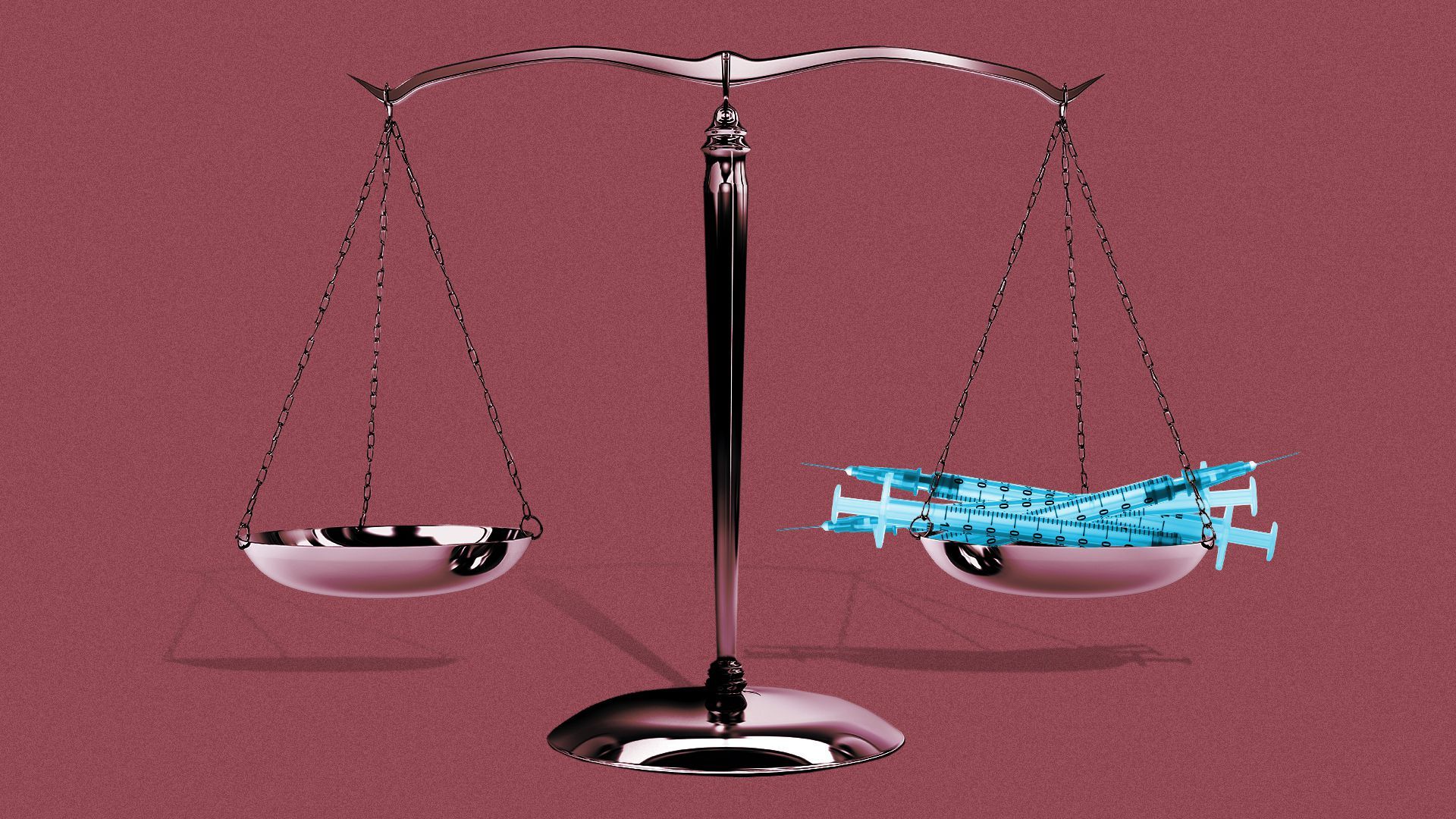


Most American businesses are holding back on requiring vaccines or testing for their employees. Now the U.S. Supreme Court is set to decide whether the Biden administration can force their hand.
Why it matters: Lives are at stake. And Omicron outbreaks are forcing business closures, flight cancellations and staffing shortages — a chaotic business environment that’s not great for the economy or employers already struggling to attract workers.
Driving the news: The Supreme Court will hear arguments this morning over two of the Biden administration’s flagship COVID-19 policies:
- An emergency vaccinate-or-test rule covering an estimated 80 million employees at large companies, issued by the Occupational Safety and Health Administration.
- A vaccine mandate for health care workers at facilities that receive Medicare or Medicaid funds.
Where it stands: Only about 18% of businesses require vaccinations, according to a November survey from Willis Towers Watson.
- The recent rise in cases, and looming mandates, have pushed some to act: Starbucks this week announced all employees must either be vaccinated or submit to regular testing.
- The Mayo Clinic fired 700 of its employees (about 1% of staff) who refused to be vaccinated.
- Plenty of others are waiting on the court, said Jeff Levin-Scherz, a population health leader at Willis Towers Watson: 32% of companies said they’d only require vaccination if it was a federal rule.
The big picture: This case is a key front in the Republican war against Biden’s vaccine requirements; 183 GOP members of Congress, including 47 senators, filed an amicus brief at the court arguing against the vaccine mandates.
Details: The federal vaccine rules were challenged by a coalition of Republican state attorneys general and conservative business and religious groups almost immediately after they were announced in November.
- The Chamber of Commerce, which typically opposes workplace regulations, is not a party in the cases.
Mandate opponents say the requirements are executive overreach.
- They claim COVID-19 is not a workplace hazard, per se, but something that’s all around us. Health care workers, in particular, should have an option other than vaccination, they argue.
- Another argument is that mandates would push workers to quit, exacerbating labor shortages. That has happened here and there, Levin-Scherz said. But the costs of employing the unvaccinated — who face higher health risks and costs, and need to quarantine for longer — is the bigger issue, he tells Axios.
The other side: The administration, public health experts and former OSHA staff say the agency is explicitly authorized to take emergency measures to protect workplace safety.
- Requiring masks, testing or vaccination is less intrusive than some other OSHA rules, they say.
- “If you’re doing asbestos removal you’re going to be wearing a moon suit,” said David Vladeck, a professor at the Georgetown University Law Center, who’s argued several OSHA cases. “The idea you have to put an n95 mask on, oh boohoo. In many workplaces that’s the least employees have to do.”
Mandate proponents emphasize that from retail stores to meatpacking plants to jails and warehouses, workplaces have been major hotspots throughout the pandemic.
- A lower court’s ruling upholding OSHA’s mandate notes that 80 of the 84 new COVID outbreaks reported in Washington state in December were in workplace settings, outside of health care.
What’s next: The court is expected to move relatively fast, possibly issuing a ruling by month’s end. Observers say that the fate of the mandate rests with three of the justices: Amy Coney Barrett, Brett Kavanaugh and Chief Justice John Roberts.
- Meanwhile, OSHA has moved the deadline for its workplace mandate to February.
Copyright Axios Media, 2022
